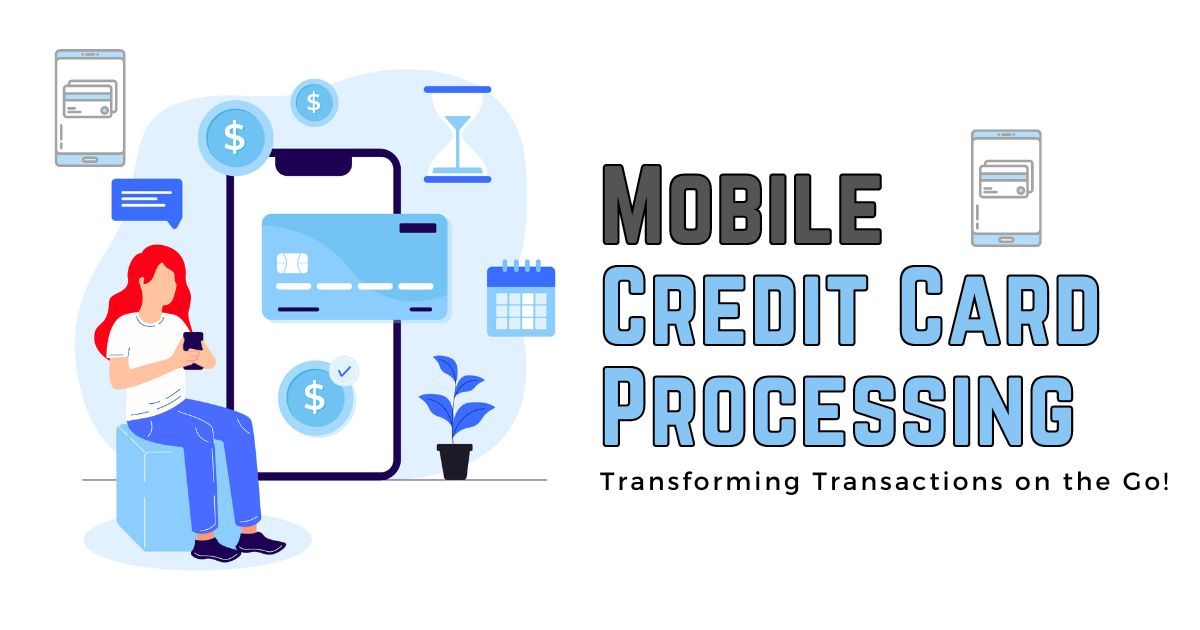
| January 8th, 2024 |
Mobile Credit Card Processing — Transforming Transactions on the Go!
In the dynamic landscape of commerce, businesses are constantly seeking innovative solutions to streamline transactions and enhance customer convenience. One such game-changing advancement is mobile credit card processing, a technology that allows businesses to accept payments anytime, anywhere using smartphones or tablets. This blog will delve into the advantages and challenges associated with mobile credit card processing, shedding light on how this technology is reshaping the way we handle financial transactions.
The Advantages of Mobile Credit Card Processing —
1. Portability and Convenience:
Mobile credit card processing liberates businesses from the constraints of traditional point-of-sale systems. With the power of a smartphone or tablet, merchants can accept payments on the go, whether they are at a pop-up event, a trade show, or providing services at a customer’s location. This level of portability not only enhances convenience but also broadens the scope of business operations.
2. Enhanced Customer Experience:
In today’s fast-paced world, customers expect seamless and quick transactions. Mobile credit card processing caters to this demand by reducing wait times and providing a swift and efficient payment experience. This contributes to overall customer satisfaction, fostering positive relationships and repeat business.
3. Reduced Costs:
Traditional point-of-sale systems can be expensive to set up and maintain. Mobile credit card processing, on the other hand, often requires minimal upfront investment. Many solutions operate on a subscription or transaction fee basis, allowing businesses to scale their payment processing costs based on their actual usage.
4. Increased Sales Opportunities:
Mobile credit card processing opens doors to new sales opportunities. Businesses can capitalize on impromptu transactions, upselling opportunities, and the ability to accept payments in unconventional settings. This flexibility can be particularly advantageous for small businesses and entrepreneurs looking to expand their reach without the burden of a fixed physical location.
5. Security Features:
Mobile credit card processing solutions prioritize security to instill confidence in both merchants and customers. Encrypted transactions, secure authentication methods, and adherence to industry standards contribute to a robust security framework, mitigating the risks associated with payment processing.
6. Real-time Transaction Tracking:
Modern mobile credit card processing solutions often come with advanced analytics and reporting features. Merchants can gain real-time insights into their sales performance, track inventory, and make data-driven decisions to optimize their business operations.
7. Adaptability to Changing Technologies:
Mobile credit card processing systems are designed to evolve with technological advancements. Integration with emerging technologies such as NFC (Near Field Communication) and contactless payments ensures that businesses stay at the forefront of the digital payment landscape.
The Challenges of Mobile Credit Card Processing —
1. Security Concerns:
While security features are a strength, the mobile nature of these systems introduces unique challenges. The risk of device theft, unauthorized access, and data breaches poses a constant threat. Merchants must implement stringent security measures and stay informed about the latest cybersecurity developments to safeguard sensitive information.
2. Reliability of Internet Connection:
Mobile credit card processing relies heavily on a stable internet connection. In areas with poor connectivity or during network outages, businesses may face disruptions in their ability to process payments. This emphasizes the need for contingency plans and offline payment capabilities to maintain operational continuity.
3. Compliance and Regulatory Issues:
The financial industry is subject to a myriad of regulations and compliance standards. Mobile credit card processing solutions must adhere to these regulations, which can vary across regions and industries. Ensuring compliance is a complex task that requires ongoing efforts to stay abreast of changes and updates.
4. Integration with Existing Systems:
For businesses with established point-of-sale and accounting systems, integrating mobile credit card processing may present challenges. Compatibility issues, data synchronization, and the need for additional hardware or software upgrades can complicate the adoption process. Thorough planning and expert guidance are essential to ensure a smooth integration.
5. Educating Merchants and Consumers:
The adoption of mobile credit card processing relies on the awareness and understanding of both merchants and consumers. Some businesses may be hesitant to embrace new technologies due to unfamiliarity or concerns about complexity. Educating stakeholders about the benefits and security measures is crucial for widespread acceptance.
6. Transaction Fees and Costs:
While mobile credit card processing can be cost-effective for small transactions, the fees associated with higher-value transactions can add up. Merchants need to carefully evaluate the pricing models of different service providers to ensure that the overall cost remains competitive and aligns with their business model.
7. Scalability Challenges:
As businesses grow, their transaction volumes and requirements may change. Scalability challenges can arise if the chosen mobile credit card processing solution cannot easily adapt to increased demand or additional features. Selecting a solution with scalability in mind is crucial for long-term success.
Conclusion —
Mobile credit card processing has undeniably revolutionized the way businesses handle transactions, offering a plethora of advantages that cater to the demands of the modern market. From enhanced convenience and portability to increased sales opportunities, the benefits are substantial. However, businesses must navigate the challenges associated with security, reliability, compliance, and integration to fully leverage the potential of this technology.
As the industry continues to evolve, staying informed about the latest developments and adopting best practices is essential. Mobile credit card processing is not a one-size-fits-all solution, and businesses should carefully assess their specific needs and constraints before making the leap. With the right approach and a commitment to addressing challenges head-on, mobile credit card processing can be a transformative force, driving efficiency, and success in the ever-evolving landscape of commerce.